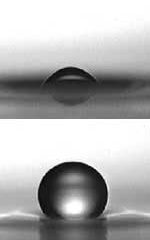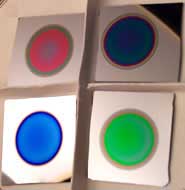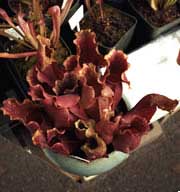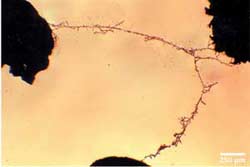
Air lets water droplets skim across the kitchen sink.
Scientists have found the answer to a question pondered over many a kitchen sink: why do little droplets skim across the surface of washing-up water rather than mix with it?
Yacine Amarouchene and colleagues at the University of Bordeaux in Talence, France have discovered that the height from which the drops fall has no effect on their lifespan 1 .
Soap, detergent – and indeed food grease – are ’

A microelectronic sensor may alert doctors to bacterial hazards.
Smart bandages could soon alert doctors to the presence of certain bacteria in a wound by glowing different colours. Researchers in the United States have created a tiny device that emits faint light of two colours in response to two types of bug 1 .
Benjamin Miller, of the University of Rochester in New York State, and colleagues hope that a refined sensor might ultimately generate an instant an

Solar cells printed like wallpaper.
Solar cells might one day be produced by the roll, as cheaply and easily as wallpaper. Scientists in Arizona are using screen-printing, a technique developed for patterning fabrics, to produce plastic solar cells 1 .
The technique is another step towards the general availability of solar power from flexible devices on plastic sheets or glass panels. The basic materials of a photovoltaic cell are inexpensive, but combining t

Mosquitoes’ evolve rapidly in response to global warming.
Mosquitoes are holing up later as winters get warmer, US ecologists have shown. This is the first genetic adaptation to global warming to be identified. Less flexible animals could face extinction, they warn.
The North American mosquito Wyeomyia smithii uses shortening day length to judge when to bed down for the winter. Modern mozzies wait nine days more than their ancestors did in 1972, William Bradshaw and Christin

Scientists can coax tiny metal particles to self-assemble into microscopic wires that conduct electricity and repair themselves, new research reveals. Kevin D. Hermanson of the University of Delaware and his colleagues, who published their finding in the current issue of Science, suggest that such nanowires may prove useful for wet electronic and bioelectric circuits.
The researchers placed particles of gold ranging in diameter from 15 to 30 nanometers in a fluid suspension within a thin ch

Water trapped for millions of years gives a glimpse of oceans’ turbulent past.
Drops of sea water entombed within salt crystals millions of years ago are giving researchers a glimpse of ancient oceans. The water, trapped during evaporation, reveals that the seas have seen large chemical changes during their history.
“The consensus had been that sea-water chemistry hadn’t changed that much over the past 600 million years,” says geochemist Juske Horita of Oak Ridge National La

– new calculation confirms standard model of particle physics. Contribution of hadronic vacuum polarization determined with unprecedented accuracy. The magnetic moment of the muon is an important precision parameter for…
Technique may prevent formation of unwanted waves that siphon off needed energy. Heating plasma to the ultra-high temperatures needed for fusion reactions requires more than turning the dial on a…

An international team of astronomers, led by researchers from the Astronomical Observatory of the University of Warsaw, have identified a new class of cosmic X-ray sources. The findings have been…

How deubiquitinases USP53 and USP54 cleave long polyubiquitin chains and how the former is linked to liver disease in children. Deubiquitinases (DUBs) are enzymes used by cells to trim protein…

Conceptual blueprint to analyze experimental catalyst data. Machine learning (ML) models have recently become popular in the field of heterogeneous catalyst design. The inherent complexity of the interactions between catalyst…

Antibody that Neutralizes Inhibitory Factors Involved in Nerve Regeneration Leads to Enhanced Motor Function after Acute Spinal Cord Injury. Researchers at 13 clinics in Germany, Switzerland, the Czech Republic and…

How simulations help manufacturing of modern displays. Modern materials must be recyclable and sustainable. Consumer electronics is no exception, with organic light-emitting diodes (OLEDs) taking over modern televisions and portable…

“Neurons that fire together, wire together” describes the neural plasticity seen in human brains, but neurons grown in a dish don’t seem to follow these rules. Neurons that are cultured…

The quest for sustainable energy solutions has been a major focus of scientific research for decades. Solar energy, a clean and renewable source, has emerged as a promising alternative to…

With a processing speed a billion times faster than nature, chip-based laser neuron could help advance AI tasks such as pattern recognition and sequence prediction. Researchers have developed a laser-based…

New technology could remotely identify various types of plastics, offering a valuable tool for future monitoring and analysis of oceanic plastic pollution. Researchers have developed a new hyperspectral Raman imaging…

Artificial Intelligence (AI) has established a strong presence across industries, large and small. The “VoBaKI” research project has empowered small and medium-sized enterprises (SMEs) with an innovative tool to independently…